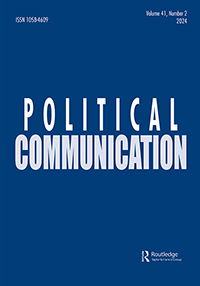Unequal Tweets: Black Disadvantage is (Re)tweeted More but Discussed Less Than White Privilege
IF 5.1
1区 社会学
Q1 COMMUNICATION
引用次数: 0
Abstract
ABSTRACT Disadvantage and privilege work together to uphold systems of inequality. Nevertheless, racial inequality is often described as Black disadvantage, while White privilege remains less visible. This one-sided framing in public discourse may result in equally one-sided understandings of and policies aimed at reducing inequality. In the present research, we examined the use of and the reactions to Black disadvantage and White privilege frames in tweets. Twitter stands out as a public sphere inspiring both online and offline political discussions and protests around racial inequality (e.g. #BlackLivesMatter). We analyzed the framing of tweets using a combination of a rule-based and a machine-learning approach, resulting in two corpora of 11,292 (Study 1) and 31,984 tweets (Study 2, a direct replication of Study 1) using comparative frames of racial inequality. Users overall more often framed inequality as Black disadvantage than as White privilege. Moreover, tweets with a disadvantage frame were more often retweeted, but less often quoted and replied to than tweets with a privilege frame. These results show that racial inequality is often one-sidedly framed in real online conversations and that this pattern may be reinforced by other users because they preferably pass on disadvantage frames. However, focusing on White privilege may provoke more discussion about racial inequality. Although effect sizes were small, these effects can impact content and perspectives in mainstream media, public opinion, and political agendas by guiding attention to certain aspects of racial inequality, but not others.不平等的推特:黑人劣势比白人特权推得更多,但讨论得更少
本文章由计算机程序翻译,如有差异,请以英文原文为准。
求助全文
约1分钟内获得全文
求助全文
来源期刊

Political Communication
Multiple-
CiteScore
13.90
自引率
2.70%
发文量
30
期刊介绍:
Political Communication is a quarterly international journal showcasing state-of-the-art, theory-driven empirical research at the nexus of politics and communication. Its broad scope addresses swiftly evolving dynamics and urgent policy considerations globally. The journal embraces diverse research methodologies and analytical perspectives aimed at advancing comprehension of political communication practices, processes, content, effects, and policy implications. Regular symposium issues delve deeply into key thematic areas.
 求助内容:
求助内容: 应助结果提醒方式:
应助结果提醒方式:


